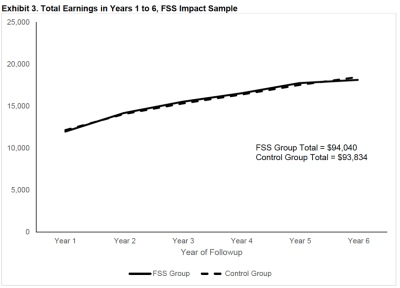Randomized Controlled Trial (RCT) of...
HUD's Family Self-Sufficiency Program to Promote Work for Housing Voucher Recipients
Reviewed
The U.S. Department of Housing and Urban Development (HUD), in January 2025, published an RCT of HUD’s $140 million/year Family Self-Sufficiency (FSS) program, which provides case management services and financial incentives to housing voucher recipients to promote work and self-sufficiency. This large, high quality RCT found no discernible impacts on employment or earnings over 6 years.
Relevant Excerpt from the Executive Summary:
During 6 years of follow-up, FSS and control groups experienced comparable employment levels and total earnings. The results do not suggest that participation in FSS improved labor market outcomes for heads of household. This evaluation uses quarterly wage records from the National Directory of New Hires (NDNH) to examine the program’s effects on employment and earnings outcomes during 6 years of follow-up. NDNH data show that nearly 90 percent of study participants from both research groups were employed during at least 1 quarter after random assignment. However, a fairly large proportion of FSS and control group members moved into and out of employment. During the 6 years, or 24 quarters, FSS group members averaged just less than 16 quarters of employment, equivalent to an average quarterly employment rate of 64 percent. Control group members recorded a similar average, which means that access to services and financial incentives through FSS did not lead to increases over control group levels on measures of employment stability.
A similar pattern is observed for earnings measured using NDNH data (exhibit 3). During the 6-year follow-up period, both FSS and control group members earned, on average, about $94,000 in total (roughly $15,600 per year), indicating the FSS program had no effects on earnings.
We have no suggested revisions to the study’s published executive summary.
No-Spin’s Study Overview
Large, high-quality RCT of HUD’s $140 million/year Family Self-Sufficiency (FSS) program, designed to promote work and self-sufficiency among housing voucher recipients, finds no discernible impacts on employment or earnings over 6 years.
Program:
- FSS is an ongoing federal program, established by Congress in 1990 and currently funded at approximately $140 million per year.
- The program provides low-income families receiving federal (Section 8) housing vouchers with case management services to connect them with job search, education, and training services. The program also provides a financial incentive to find work – namely, an escrow account which acts as a long-term savings account.
- The program costs approximately $6,000 per participant.
Study Design:
- The study sample comprised 2,656 households (housing voucher recipients) that were interested in participating in FSS at one of 18 Public Housing Authorities across 7 states. The households were randomized to treatment (the FSS program) versus a control group.
- Based on our careful review, this was a high-quality RCT (e.g. baseline balance, large sample, negligible attrition, successful program implementation).
- The study’s prespecified primary outcomes were employment and earnings.
Findings:
- The study found no discernible impacts on employment rates or earnings, measured over the full 6 years after study entry and in each of the 6 individual years.
- The following graph shows nearly identical annual and total earnings for the treatment versus control group over the 6 years.

Click or tap a highlight to see No-Spin’s comment